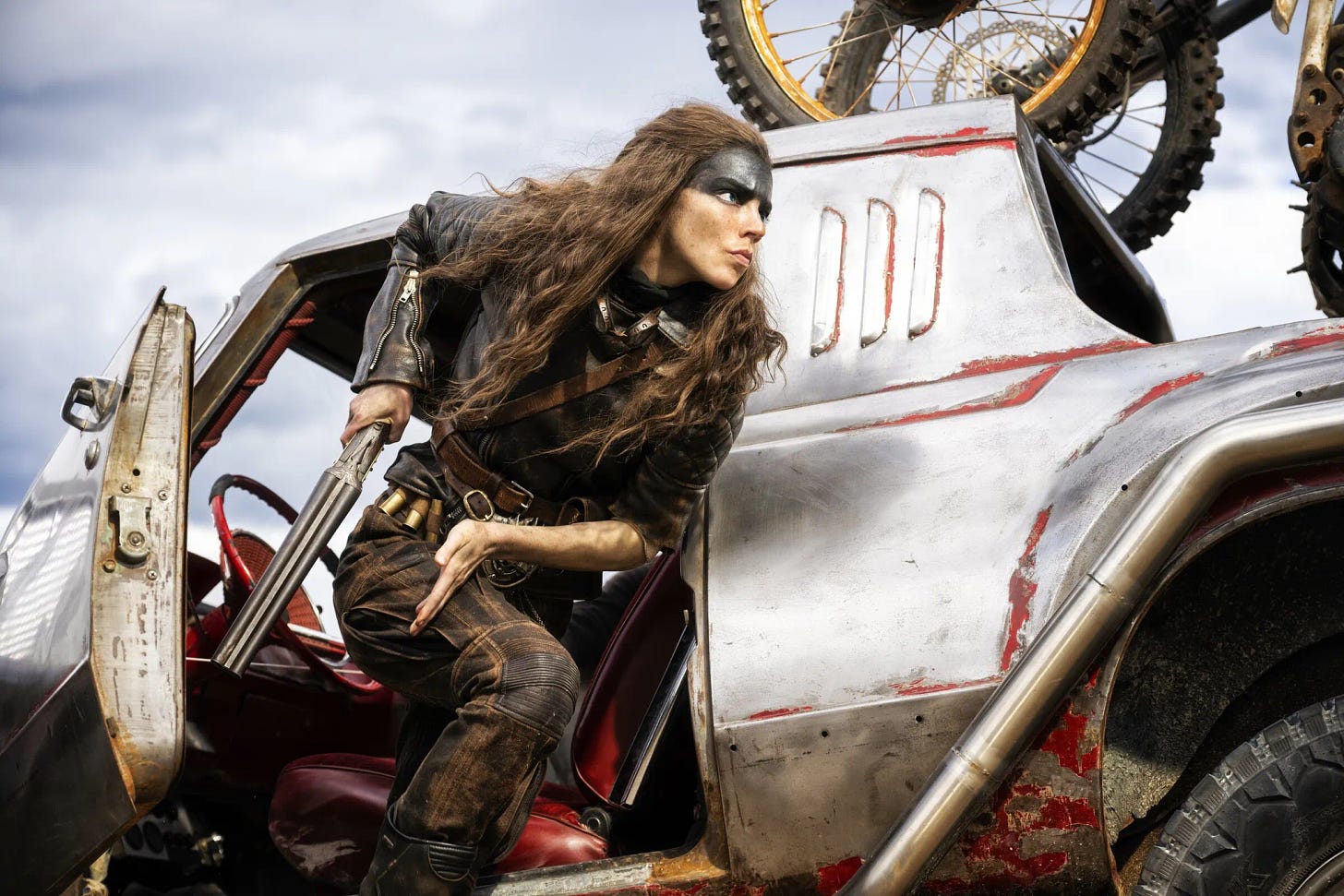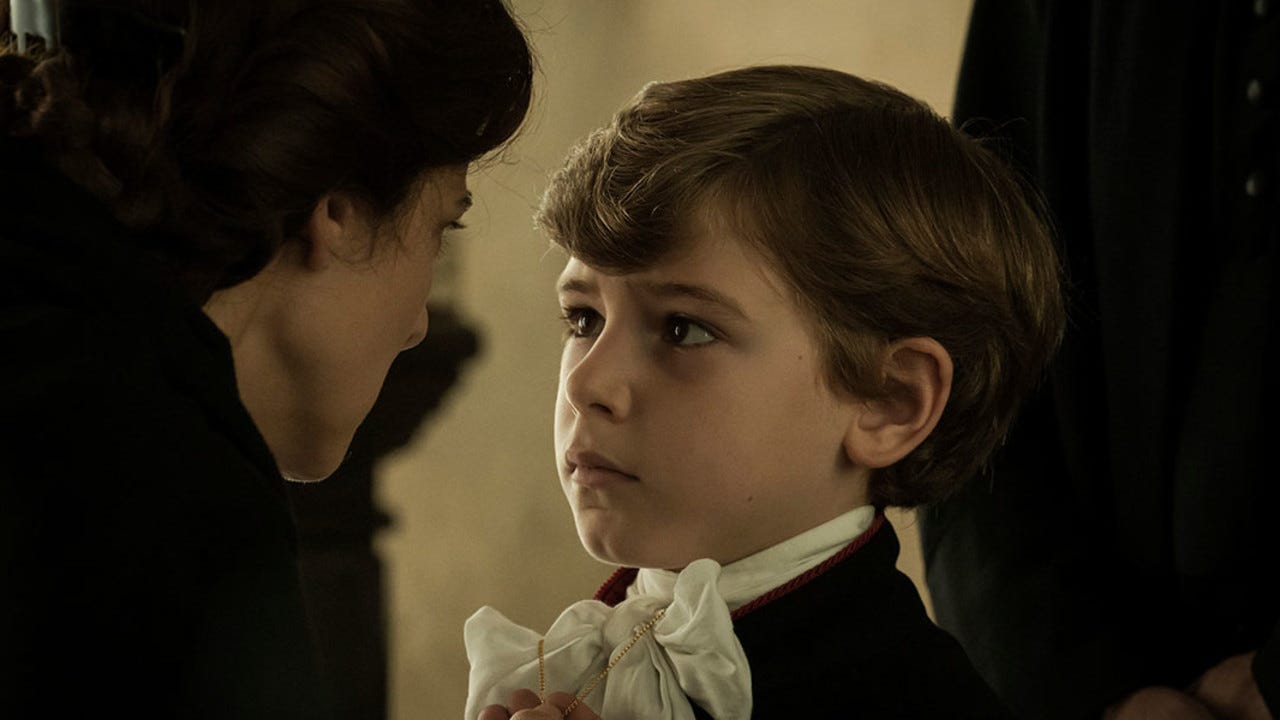In Review: 'Furiosa: A Mad Max Saga,' 'Kidnapped'
George Miller's latest revisits his post-apocalyptic wasteland from a different perspective and a new drama unearths a strange, dark story from Italy's past.
Furiosa: A Mad Max Saga
Dir. George Miller
148 min.
It’s fascinating to think about the relationship between George Miller’s 1979 film Mad Max and his exhilarating fourth sequel—or, in this case, prequel—Furiosa: A Mad Max Saga, two revenge thrillers that spring from the same post-apocalyptic landscape of wretched men and rumbling machines, but are worlds apart in scope and in the symbolic value of loner heroes. Rooted in the cheap-thrills grime of Ozsploitation, the original Mad Max felt like the evolution of modern rogues like Dirty Harry and Paul Kersey, with Mel Gibson as another fed-up vigilante answering lawlessness with his own violent sense of order and justice. Building off Mad Max: Fury Road, which introduced Charlize Theron as a rig driver with her own righteous agenda, Furiosa traces the origins of another determined warrior, but there’s more on the docket than revenge.
After the no-holds-barred intensity of Fury Road—instantly on the short list for the greatest action movie ever made—Miller has the counterintuitive audacity to make a longer film with fewer big setpieces, though it should be said that Furiosa moves fleetly and delivers the goods in reasonable abundance. To call the film contemplative would go too far, but the extra time and space allows for a more intimate detailing of a single character’s journey and more oxygen for the themes of hope and rebirth that poke like green shoots through a desolate wasteland. Keen-eyed viewers will also note that Max Rockatansky is a man and Furiosa is a woman, and Miller makes the gender gap a major point of emphasis, rather than asserting their equal toughness and leaving it at that. This dystopia is a world of men, defined by ceaseless brutality and cyclical violence, and Furiosa suggests a future that redresses the balance.
Furiosa is about Eden lost and sought for again, a metaphor bluntly introduced in the gut-wrenching opening scene, when 10-year-old Furiosa (Alyla Browne) reaches for a ripe fruit dangling from a tree in a secret outpost called the Green Place of Many Mothers. A few grizzled marauders on motorcycles have discovered her and this place, and the value of both in a desolate wasteland populated mostly by men is inestimably high. After a frantic chase across the desert, where Furiosa’s mother tries to retrieve her and keep the location of the Green Place under wraps, the bikers deliver their captive to Warlord Dementus (Chris Hemsworth), who has assembled a large nomadic force around him. In a dramatic bid for power. Dementus and his followers attempt to seize The Citadel, the immense fortress ruled by Immortan Joe (Lachy Hulme), but he underestimates his adversary and loses Furiosa to Joe, who’s been collecting young women as child-bearers.
From there, young Furiosa, now played as an adult by Anya Taylor-Joy, has to leverage some kind of power for herself in the middle of Dementus and Joe’s standoff, which gives the film a Yojimbo-like quality, especially once she becomes a useful cog in The Citadel’s war machine. The physical differences between Taylor-Joy and Charlize Theron, who’s much more imposing as the older Furiosa in Fury Road, are cleverly managed by Miller, who turns Taylor-Joy’s wiry slightness into an advantage, as she uses her lithe, graceful frame to slips into places where other War Boys can’t fit. She spends the film’s most exhilarating action setpiece underneath a giant fortified oil tanker as it’s under ceaseless attack from enemy raiders, zipping around the chassis to defuse threats and launch surprise counters.
Like all prequels, Furiosa has to make an argument for its own relevance, since we already know who its hero will grow up to be. But Miller’s decision to go deeper into Furiosa as a character, moving away from Max completely, shifts perspective profoundly on the world he’s created and offers the possibility of a future that’s not wholly poisoned by revenge and the evil that men do. There’s plenty of the expected action—though some of the CGI work here gets surprisingly janky—but the more expansive running time gives Miller room to clarify the political geography of his wasteland and allow the actors to cook. As dark as it gets, Furiosa is often endearingly silly, riffing on language and giving Hemsworth, in particular, a forum to be a swaggering buffoon, an alpha-male parody who’s arranged his motorcycle transport like Ben-Hur’s chariots. Mostly, the film feels unusually surprising: We may know where characters like Furiosa and Immortan Joe will end up, but Miller continues to find fresh angles and new corners in this world he’s created, and even a tiny sliver of redemption, too. — Scott Tobias
Furiosa: A Mad Max Saga opens tonight in theaters everywhere.
Kidnapped
Dir. Marco Bellocchio
125 min.
A 19th-century incident that sparked global outrage only to be lost to history for years, the story of Edgardo Mortara is shocking, strange and still infuriating over a century later. In 1858, police arrived at the door of Salomone Mortara, a Jewish merchant known to his friends as Momolo. Residents of Bologna, then a part of the Papal States, Momolo and his wife Marianna were parents to eight children. The police left with one of them, six-year-old Edgardo. The reason? Thinking Edgardo on his deathbed and fearing for his mortal soul, their devout Catholic servant Anna had performed a baptism ceremony when Edgardo was an infant, making him a Christian in the eyes of the state. And because Christians could not be raised by non-Christian parents according to the law of the land, Edgardo belonged in Rome at the Casa dei Catecumeni, where the children of Jewish converts could learn to be Christians.
Kidnapped, the latest from the veteran Italian director Marco Bellochio, retells Edgardo’s story via a historical drama that makes some bold choices that don’t always pay off. Though characters refer to the scandal created by the incident, Bellochio rarely strays from the perspectives of Edgardo (played as a child by Enea Sala and as a young man by Leonardo Maltese), Momolo and Marianna (Fausto Russo Alesi and Barbara Ronchi, respectively), and Pope Pius IX (Paolo Pierobon), who takes a personal interest in Edgardo’s case that only intensifies when Edgardo’s story becomes a political liability. The incident unfolded in the waning days of the Papal States’ power as the move for a unified Italy gained momentum and contributed to Pius IX decline in popularity. But Kidnapped largely lets historical forces play out in the background as Edgardo’s parents desperately try to reclaim him from a pope determined to keep the “Christian” boy in the fold. All the while, Edgardo remains caught in the middle.
Despite strong performances, the tight focus doesn’t always play to Kidnapped’s strengths. Scripted by Bellochio and Susanna Nicchiarelli, the film commits to playing the Mortara incident as a psychological drama but skimps on the psychology. It’s a film with clear heroes and villains that works best when exploring the details of the historical turning point on which it’s staged and as an unsparing depiction of the Church’s past and the anti-semitism it helped weave into European culture and beyond. The final act, set years after the main action, depicts the grown Edgardo as a knot of conflicting loyalties but mostly acknowledges those conflicts without probing beneath their surface. Still, it’s a fascinating story handsomely told by a sure-handed director. Edgardo’s story might be a footnote in 19th century history, but Bellochio gets that sometimes footnotes can reveal just as much as the text they amend. —Keith Phipps
Kidnapped opens in limited release tomorrow.









Regarding Furiosa, me can only bring to mind words of a great M0therfucker:
NOT OPTIONAL
When I saw FURY ROAD, I was sat in the very front row. It was a good front row, though: dead center, reclining seats, reasonable distance from the screen. Figured I'd be fine. Then the movie happened, and it was such an overwhelming tide of shit happening that I spent the whole rest of that night being violently motion sick. Even the shakiest shaky-cam movies haven't done that to me. 10/10, absolute masterpiece.
Will be sitting in the back row when I see Furiosa this weekend.